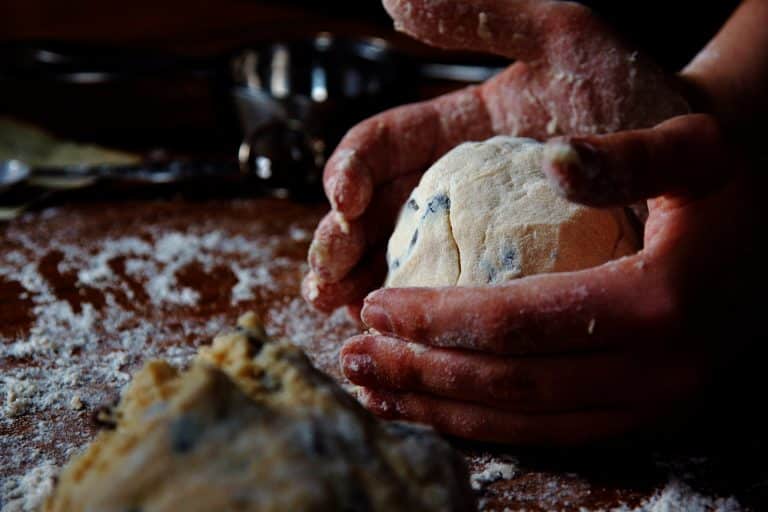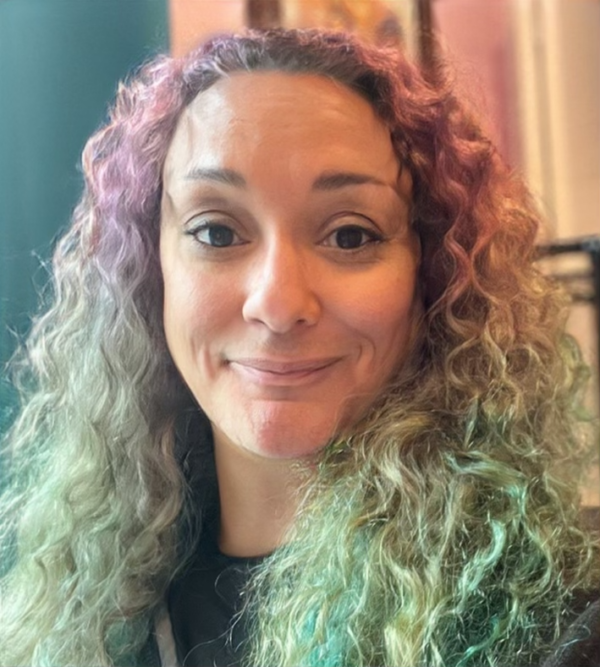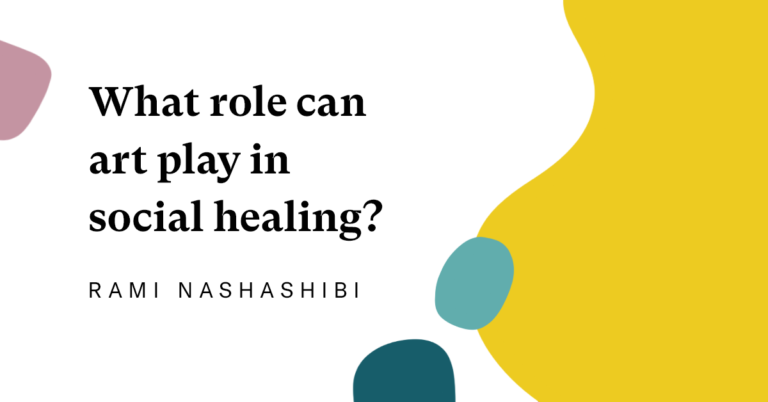
Image by Michael / helloturkeytoe/Flickr, Attribution.
Resistance and Belonging: A Bread Meditation
When I make bread, I always start with two cups of bread flour and one cup of dark rye flour.
I love bread; it’s probably my favorite thing to eat. Bread soothes me physically, emotionally, even spiritually. Baguettes, ciabatta, challah, naan, steam buns. I could eat my way around the world on bread alone, but I would always come home to the dense richness of rye flour. That dark, rich bread resides about as far from the plastic wonder of my childhood as I can get — memories of poverty I’d sooner forget. So my everyday bread is at least one third rye. To this I add a couple tablespoons of raw sugar, a couple teaspoons of sea salt, a few tablespoons of potato flakes, and caraway seeds. And of course yeast — a good sourdough if I have one, wine or beer yeast is a good second, but everyday bread yeast works just fine.
I’ve been baking bread twice a week for a few months now, ever since I left social media. It is a great stress reliever for me, a warm and wholesome activity that juxtaposes against the frenetic life of the internet that had me bound, a slave to its data collection algorithms.
It was harder for me to leave social media than I thought. In fact, I’m still not completely off. I periodically read Medium posts, and I log into Twitter every week or two to respond to the occasional direct message, but that’s about it. The longer I am away, the harder it is to find a reason for me to stay. The arguments about community and personal connectedness fall flat when I realize no one is clamoring to lure me back. If they notice I am gone at all, it is a passing mention, quickly overshadowed by the latest viral retweet.
I’ve come to realize that the more I was connected on social media, the more I was disconnected from my life and myself. How easy it was to follow the dread thoughts of everyone I wanted to agree with and ignore that I was hungry, or I was tired, or I was hearing my children crying. The longer I am away, the more I realize that social media didn’t actually connect me to anything. I sat at my screen convinced I was doing something, or learning something, when the reality was just that it was easy to press the buttons.
I’ve since gotten involved with local organizations involved in immigrant rights and other causes and one thing strikes me: It’s really hard. Talking to people about these issues, facing people you disagree with, actually attending meetings, seeing my own status as a person of privilege when I’m talking with someone who has less than me — all of it is really hard. Social media made me feel like I was doing something because I could retweet some outrage without actually doing something. Social media promised me connection, but it offered only a seduction of ease.
To the dry ingredients, I add two vital wet ingredients: remnants of my childhood in Western New York that have become a part of my personality. I grew up in neighborhoods filled with Italians, Greeks, and German Jews. Their foods invaded my childhood and became a part of me. Pasta and spanakopita will always be my comfort foods, and I love vegetables that have been rotting in the basement for months. They affected my bread recipe as well. I won’t bother baking bread if I don’t have a third of a cup of a good sauerkraut brine and the same amount of a good olive oil. To that, I add about two thirds of a cup of water and mix it into a sticky mess with a wooden spoon, then I turn it out onto the counter and begin the real ritual. The one that takes the most time.
When I dropped off social media, I didn’t realize the time I would gain back. Months ago, I had routinely spent an hour on Twitter feeling as though I hated both myself and the world. It was so easy to get caught up in the tide, the swell of voices. Like a small boat, I was buoyed by that wave. At times, my life seemed even to come from that wave. It wasn’t until I came to rest on the beach, until I turned around to look at the ocean of woe, that I realized what the wave was. Standing there on that shore of solace, I realized I had talked so easily about joining The Resistance without ever really thinking about just what it was I was resisting.
Here’s a secret about bread: It doesn’t really require kneading. You just need time. Let flour and water sit for long enough, and it’ll become bread. Knowing that, I still knead my bread. I don’t knead to generate gluten, but because it’s a meditation. I need to knead. Push, fold, twist, push, fold, twist, push, fold, twist… Sometimes I lose myself in the tactile repetition of it, time stretching into the dough as I push, fold, twist over and over like waves turning the sand on a beach.
When I knead bread, the din of the world quiets and the repetition brings a space for contemplation of my tiny place in the world. The rhythm of kneading bread is what put me on that quiet beach, watching the waves that had carried me. It was while kneading bread that I came to realize that The Resistance wasn’t anything new at all; in fact, it is the same thing I’d always been fighting. I wasn’t joining a new movement, but merely jumping into the latest wave crashing against the beach.
Push, fold, twist, push, fold, twist. After ten minutes or so, I put my dough in a bowl and cover it to rise overnight.
This daily bread is the union of disparate cultures, separate waves that crashed upon the American shores. A rye, salted by the pickled vegetables of German Jews, flavored by the oil of Italians and Greeks. When I make it, I think of how these people were once rejected by America. Both are now such an accepted part of our country that it comes as no surprise to find a black person cooking with sauerkraut and olive oil. They are ingredients so common as to be mundane.
Generations ago, there were waves of hated outcasts who came here seeking a better life; now those outcasts are merely common ingredients of America. It makes me wonder: What rules guide our society to determine when “they” can finally become “us”?
I let the dough rise for between five and 18 hours — the longer the better — punching it down every six hours or so. When I’m ready, I fold the dough into a ball, cover it with a thin layer of flour, cut slices into the top, and place it on floured parchment paper to proof for a couple hours until it’s about twice the size. Toward the end of this time, I set my oven at 375 degrees and put my cast-iron Dutch oven inside to heat it up. After warming the Dutch oven for about 30 minutes, I use the parchment paper to lower the loaf into it and cook it covered for 25 minutes, then uncovered for another 25. The cast iron is not mandatory — the bread will cook fine on a cookie sheet or in a loaf pan — but the even heat and the steam from covering it makes a nice crust.
I can’t always eat my bread when it comes out of the oven. Lately, I’ve been baking the communion bread for our church, so sometimes I have to wait. But if I’m baking it for the house, I have to eat some right away. Warm bread is a soft blanket for my soul. I spread a stinking French cheese onto this blend of Jewish and Italian flavors and wonder when the spices from our Muslim cousins will invade a bread as easily? Once we talked of the Greeks invading and ruining our country; now we have Greek festivals and My Big Fat Greek Wedding. Mexicans have been a part of this country since before it was a country, yet we are building a wall to protect ourselves from them. Muslims have been here since Thomas Jefferson used his copy of the Qur’an to inspire his thoughts on church and state. Why are we suddenly treating them as dangerous newcomers?
My own ancestors, slaves upon whose very backs our country itself was built, still have yet to be accepted. Why is African culture and language denigrated and mocked even while European culture is honored? When in America will a name like Trayvon be as acceptable as Tony?
Waves have crashed upon this land’s shores since Spain paid for an Italian to turn the lives of her native peoples upside down. Why are some waves allowed to come ashore, while others are forever adrift, left to ride the tide, never finding the quiet peace of America’s fair shores? Why are some people allowed to become a part of our fabric while others are forever outsiders?
This, I realize, is what I am resisting, what I have always resisted. The fact that some people may never be accepted as truly American. The fact that some religions, some ethnicities, some cultures will always be outsiders. We speak of The Resistance as if this is something new, but this is not new. The backlash to the first black presidency of a white-supremacist and borderline-authoritarian one is as quintessentially American as you can get.
Yet there is something new about this: the scale. The sheer amount of positivity. There’s a momentum of compassion now juxtaposed against the nationalism with a force not often seen. Even people previously deaf to the calls of oppression are turning inward and realizing that their silence is complacency, that their privilege can be a power for good. There is a wave of people who are saying,
“I am safe, and that safety should be a shield to help others.”
This, I realize, is my difficult task. Others have more privilege than me, but I have more than others. When I went to my first immigrant rights meeting it became clear to me that I have a level of privilege that can’t be denied, and that gives me a responsibility. As much as I write about the responsibility of privileged white people in a racially divided America, I realize that as a light-skinned black person in a community that is 25 percent Latino, I walk on a different side in this place. I look “exotic,” not “illegal.” In so many ways, I carry that same responsibility I call out in others.
For me, The Resistance means resisting the temptation to return to ease. Social media was easy.
Tomorrow, there is another immigrant rights meeting. It’s tempting to avoid it, to avoid facing the fact that Latino women watch my children in daycare. But even though that’s hard, I’m going. I’m going because I can help — because I have to help.
And because I baked a loaf of bread to share with them.


Share your reflection